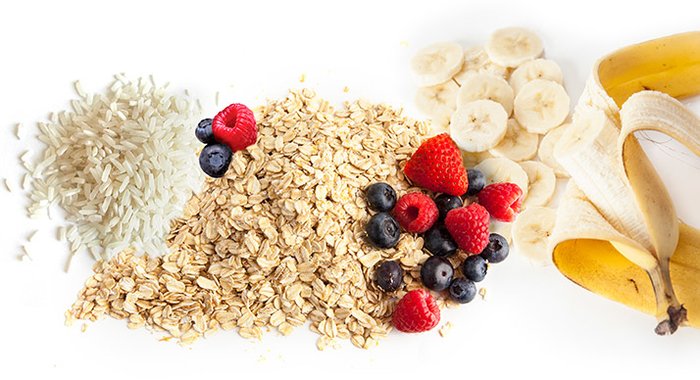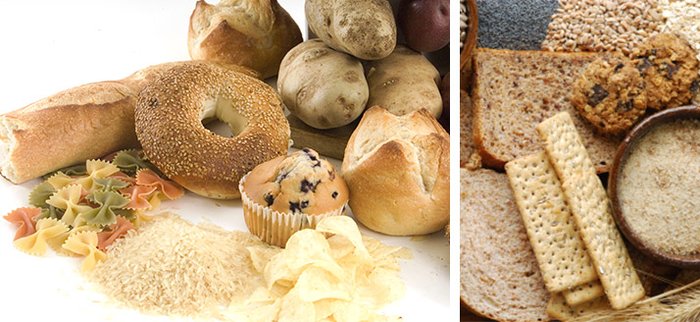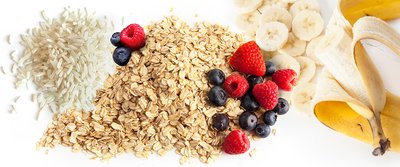
If your goal is to lose weight, eat fewer calories. Seems pretty simple. However, as most of us know, cutting calories is no easy feat, especially when working toward a 10-, 12-, or even 16-week transformation challenge. Following a regimented diet requires focus, determination, and a lot of willpower. It's easy to stay motivated early on, when all of your hard work is rewarded with steady weight loss and noticeable changes in your physique. But as the body adapts to your new diet and reduced calorie intake, your metabolism slows down—as does your weight-loss progress.
Sure, you can drop more calories from your diet, but this will ultimately leave you feeling sluggish, tired, and unmotivated, especially at the gym. Not to mention your time at work will be spent daydreaming about all-you-can-eat buffets and the latest Ben & Jerry's flavors.
Rather than getting frustrated and giving up when your progress stalls, consider changing things up with your diet, and start eating more food. It may sound nonsensical, but scheduling periodic "breaks" in your diet can help to boost hormone levels, turning you back into a lean, mean, fat-burning machine.
Eating more food on one or two days of the week can also make dieting a little more manageable. Sound too good to be true? Keep reading to find out how to rev up your metabolism and shed excess body fat using the power of leptin.
What Is Leptin?
Let's start with the basics. Leptin is a hormone released from fat tissue that plays a key role in regulating hunger and feelings of satiety. While leptin has many functions in the body, the main function is to control or regulate fat-cell size.[1] Once leptin is released from fat cells, it is believed to signal to the brain that the body has received adequate food—and that it's time to put the fork down.[2,3]
Knowing that leptin is good for the body, let's take a look at five key factors that can influence leptin levels, both negatively and positively.
1. Fasting
This one might seem like a no-brainer. We've all either heard or expressed the occasional "I got so busy I forgot to eat," which is often followed by "I'm so hungry I could eat a cow." So it's no surprise that periods of fasting can wreak havoc on your leptin levels, leaving you with the feeling of starvation. Fasting is thought to cause a survival mechanism responsible for decreasing levels of leptin and increasing the hormone responsible for stimulating hunger— ghrelin.[1,6] While it's a bit unclear how long it takes for leptin levels to become clinically suppressed, it's likely that those with relatively low body-fat percentages consuming reduced-calorie diets (specifically low-carbohydrate diets) are already experiencing some notable decreases in leptin concentrations.

It's no surprise that periods of fasting can wreak havoc on your leptin levels.
2. Exercise
We know that exercise burns calories, which can over time lead to weight loss and reduced body-fat stores. But most of us forget that overall body mass, including fat tissue, impacts total daily energy expenditure. In fact, studies have shown significant reductions in resting energy expenditure following fat loss. So while losing weight is great for our physique, it can have a negative impact on leptin levels and metabolism.[7]
3. Body Composition
Fat cells secrete leptin, so a lower body-fat percentage negatively affects leptin—meaning less production and secretion of this appetite-suppressing hormone.[2,10,11] It is interesting and important to note that people with higher body-fat percentages have elevated leptin concentrations, which many researchers believe results in leptin resistance.[10,12,13] In leptin resistance, the brain simply becomes insensitive to the hormone, drastically reducing its effects on hunger and satiety.
4. Overfeeding
Overfeeding can have profound effects on leptin concentrations in the body. However, not all macronutrients are created equal. Fat overfeeding does not elicit the same leptin response as carbohydrate does. In fact, fat has virtually no effect on leptin concentrations, and in some cases even reduces leptin levels.[14,15,16]
Carbohydrates, on the other hand, have a positive impact on leptin.[15,17,18] In fact, high-glycemic carbs (e.g., sugar) may be the sole reason for increases in leptin after meals.[19] It should be noted that leptin does not particularly increase immediately after a meal per se, but does so anywhere from 4-48 hours after carbohydrate refeeding.[1,17,20] In the short term, leptin concentrations are not affected and should be taken into account during planned refeeds.
Overdosing on protein does not directly affect leptin levels either, although studies do show that diets high in protein can help reduce body weight, despite variations in leptin concentration in the body.[21,22]

Carbohydrates have a positive impact on leptin.[15,17,18]
5. Daily Variations and Sleep
As if all of these factors affecting leptin aren't enough, studies show that leptin, like all other hormones in the body, hits peaks and valleys over the course of the day. Leptin concentrations appear to be highest between midnight and 2 a.m. and typically subside to baseline levels around 8 a.m. Rest and recovery—especially sleep—may be just as important in maintaining optimal leptin levels as diet and exercise. Research indicates that sleeping fewer than eight hours per night over the long term can result in unfavorably low leptin concentrations.[23]
Nutritional Recommendations
Now that you've got the lowdown on leptin, it's time to factor it into your diet. Here are the need-to-know guidelines to control leptin and enhance that fat-burning potential you've been looking for.
Calories
To start with, you need to know how many calories to consume. Estimating total daily energy expenditure (TDEE) can be done in a number of ways. The easiest way is to use our TDEE calculator, which is built on the Mifflin-St. Jeor formula. This formula calculates your basal metabolic rate, or the number of calories you burn at rest, and then adds an activity factor to calculate your TDEE.
Protein
In lieu of carbohydrate refeeding, protein levels should go relatively unchanged, as they do not affect the overall leptin response. According to the International Society of Sports Nutrition, exercisers should consume 0.6-1.0 grams of protein per pound of body weight each day.[24]
Carbohydrates
Based on the research presented above, there are a few ways that carbohydrates can be manipulated to boost leptin levels when you're already dieting down and in a negative energy balance. The guidelines below should be cycled and not used daily, because chronically elevated hormone levels will eventually lead to reduced sensitivity in brain receptors.
Throw in a carbohydrate refeed day. As research clearly shows, for this to have any effect it must be done with high-glycemic carbohydrates to really see a solid increase in leptin levels.
Mark up your TDEE by 25-40 percent. Once you've got your TDEE established, subtract out calories from protein and leave the rest to carbohydrates and fats.
Remember to keep fat intake minimal (around 10-20 percent of total TDEE).
Not so convinced about doing the whole "cheat day" thing? Since leptin is not considered to be an acute modulator of feeding, utilize 1-2 carbohydrate refeed meals per day for 2-3 days to get a leptin boost. Increase calorie consumption by 25-40 percent for each meal, strictly from carbohydrate sources.
Important: Despite manipulating carbs, general meal planning rules still need be followed, such as eating every 2-3 hours and not saving all your carbohydrates for your prebedtime snack. In fact, carbohydrates should be front-loaded and consumed earlier in the day for a couple of important reasons:
Consuming high-glycemic-index carbohydrates earlier in the day leads to an earlier initiation, and a longer onset, of leptin release.[19]
Carbohydrates provide energy, and if you're not using that energy, it will inevitably go to fat stores. Resting metabolism is much higher in awake, active states than it is in sedentary or sleep states.

Carbohydrates should be front-loaded and consumed earlier in the day.
Fat
During carbohydrate refeed days, fat should be kept to a minimum so it doesn't interfere with boosting leptin levels. If you're following a carbohydrate refeeding meal over the course of 2-3 days, fat intake should still be kept around 20 percent of your daily calories. Sorry, but if you're goal is to boost leptin, then the ice cream, pizza, and other high-fat foods just won't cut it for carbohydrate refeed days.
Refeeds are a powerful way to boost leptin levels and your metabolism. If done correctly, including refeed days into your diet plan will allow your body to continue to burn fat at an optimal rate, putting you that much closer to your dream physique.
References
- Weigle, D. S., Duell, P. B., Connor, W. E., Steiner, R. A., Soules, M. R., & Kuijper, J. L. (1997). Effect of Fasting, Refeeding, and Dietary Fat Restriction on Plasma Leptin Levels 1. The Journal of Clinical Endocrinology & Metabolism, 82(2), 561-565.
- Jørgensen, J. O., Vahl, N., Dall, R., & Christiansen, J. S. (1998). Resting metabolic rate in healthy adults: relation to growth hormone status and leptin levels. Metabolism, 47(9), 1134-1139.
- Jeon, J. Y., Steadward, R. D., Wheeler, G. D., Bell, G., McCargar, L., & Harber, V. (2003). Intact sympathetic nervous system is required for leptin effects on resting metabolic rate in people with spinal cord injury. The Journal of Clinical Endocrinology & Metabolism, 88(1), 402-407.
- Levine, J. A., Eberhardt, N. L., & Jensen, M. D. (1999). Leptin Responses to Overfeeding: Relationship with Body Fat and Nonexercise Activity Thermogenesis 1. The Journal of Clinical Endocrinology & Metabolism, 84(8), 2751-2754.
- Roberts, S. B., Nicholson, M., Staten, M., Dallal, G. E., Sawaya, A. L., Heyman, M. B., ... & Greenberg, A. S. (1997). Relationship between circulating leptin and energy expenditure in adult men and women aged 18 years to 81 years. Obesity Research, 5(5), 459-463.
- Klok, M. D., Jakobsdottir, S., & Drent, M. L. (2007). The role of leptin and ghrelin in the regulation of food intake and body weight in humans: a review. Obesity Reviews, 8(1), 21-34.
- Leibel, R. L., Rosenbaum, M., & Hirsch, J. (1995). Changes in energy expenditure resulting from altered body weight. New England Journal of Medicine, 332(10), 621-628.
- Doucet, E., Imbeault, P., St-Pierre, S., Almeras, N., Mauriege, P., Despres, J. P., ... & Tremblay, A. (2003). Greater than predicted decrease in energy expenditure during exercise after body weight loss in obese men. Clinical Science, 105(1), 89-96.
- Goldsmith, R., Joanisse, D. R., Gallagher, D., Pavlovich, K., Shamoon, E., Leibel, R. L., & Rosenbaum, M. (2010). Effects of experimental weight perturbation on skeletal muscle work efficiency, fuel utilization, and biochemistry in human subjects. American Journal of Physiology-Regulatory, Integrative and Comparative Physiology, 298(1), R79-R88.
- Sinha, M. K., Opentanova, I., Ohannesian, J. P., Kolaczynski, J. W., Heiman, M. L., Hale, J., ... & Caro, J. F. (1996). Evidence of free and bound leptin in human circulation. Studies in lean and obese subjects and during short-term fasting. Journal of Clinical Investigation, 98(6), 1277.
- Lammert, O., Grunnet, N., Faber, P., Bjørnsbo, K. S., Dich, J., Larsen, L. O., ... & Quistorff, B. (2000). Effects of isoenergetic overfeeding of either carbohydrate or fat in young men. British Journal of Nutrition, 84(02), 233-245.
- Heymsfield, S. B., Greenberg, A. S., Fujioka, K., Dixon, R. M., Kushner, R., Hunt, T., ... & McCamish, M. (1999). Recombinant leptin for weight loss in obese and lean adults: a randomized, controlled, dose-escalation trial. JAMA, 282(16), 1568-1575.
- Hukshorn, C. J., Saris, W. H., Westerterp-Plantenga, M. S., Farid, A. R., Smith, F. J., & Campfield, L. A. (2000). Weekly subcutaneous pegylated recombinant native human leptin (PEG-OB) administration in obese men. The Journal of Clinical Endocrinology & Metabolism, 85(11), 4003-4009.
- Horton, T. J., Drougas, H., Brachey, A., Reed, G. W., Peters, J. C., & Hill, J. O. (1995). Fat and carbohydrate overfeeding in humans: different effects on energy storage. The American Journal of Clinical Nutrition, 62(1), 19-29.
- Dirlewanger, M., Di Vetta, V., Guenat, E., Battilana, P., Seematter, G., Schneiter, P., ... & Tappy, L. (2000). Effects of short-term carbohydrate or fat overfeeding on energy expenditure and plasma leptin concentrations in healthy female subjects. International Journal of Obesity, 24(11), 1413-1418.
- Havel, P. J., Townsend, R., Chaump, L., & Teff, K. (1999). High-fat meals reduce 24-h circulating leptin concentrations in women. Diabetes, 48(2), 334-341.
- Romon, M., Lebel, P., Velly, C., Marecaux, N., Fruchart, J. C., & Dallongeville, J. (1999). Leptin response to carbohydrate or fat meal and association with subsequent satiety and energy intake. American Journal of Physiology-Endocrinology And Metabolism, 277(5), E855-E861.
- Hagobian, T. A., Sharoff, C. G., & Braun, B. (2008). Effects of short-term exercise and energy surplus on hormones related to regulation of energy balance. Metabolism, 57(3), 393-398.
- Herrmann, T. S., Bean, M. L., Black, T. M., Wang, P., & Coleman, R. A. (2001). High glycemic index carbohydrate diet alters the diurnal rhythm of leptin but not insulin concentrations. Experimental Biology and Medicine, 226(11), 1037-1044.
- Kolaczynski, J. W., Nyce, M. R., Considine, R. V., Boden, G., Nolan, J. J., Henry, R., ... & Caro, J. F. (1996). Acute and chronic effect of insulin on leptin production in humans: studies in vivo and in vitro. Diabetes, 45(5), 699-701.
- Izadi, V., Saraf-Bank, S., & Azadbakht, L. (2014). Dietary intakes and leptin concentrations. ARYA atherosclerosis, 10(5), 266.
- Weigle, D. S., Breen, P. A., Matthys, C. C., Callahan, H. S., Meeuws, K. E., Burden, V. R., & Purnell, J. Q. (2005). A high-protein diet induces sustained reductions in appetite, ad libitum caloric intake, and body weight despite compensatory changes in diurnal plasma leptin and ghrelin concentrations. The American journal of clinical nutrition, 82(1), 41-48.
- Spiegel, K., Leproult, R., L’Hermite-Bale?riaux, M., Copinschi, G., Penev, P. D., & Van Cauter, E. (2004). Leptin levels are dependent on sleep duration: relationships with sympathovagal balance, carbohydrate regulation, cortisol, and thyrotropin. The Journal of Clinical Endocrinology & Metabolism, 89(11), 5762-5771. Chicago
- Kreider, R. B., Wilborn, C. D., Taylor, L., Campbell, B., Almada, A. L., Collins, R., ... & Antonio, J. (2010). ISSN exercise & sport nutrition review: research & recommendations. Journal of the International Society of Sports Nutrition, 7(7), 2-43.

